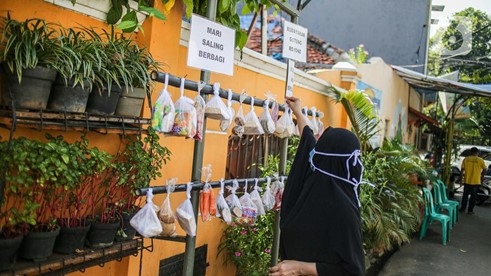From Fear to Fight Back: Women’s Empowerment Through “Jogo Tonggo” Program During Covid-19 Rage in Karang Nangka Village Banyumas County-Indonesia
Abstract
Worldwide, rural communities face previously unheard-of difficulties due to the COVID-19 pandemic. This study examines the "Jogo Tonggo" initiative in Karang Nangka Village, Indonesia, which represents local community empowerment and resilience. In light of the constraints experienced by women and marginalized communities, this project initiated by the community effectively organized a localized response to the pandemic. It simultaneously encouraged active involvement, empowered individuals to take on leadership roles, and facilitated socioeconomic progress, focusing on women. The goal is to clarify the model's significant influence on health outcomes, gender inclusivity, and social capital. A study was conducted to explore qualitative data through interviews, focused group discussions, and participatory data analysis. The findings demonstrate significant improvements in health literacy, economic engagement, digital proficiency, and social cohesion due to the initiative's comprehensive empowerment strategies. Women took on prominent leadership positions in coordinating emergency response and recovery efforts. This endeavor disrupted antiquated gender norms while fostering enduring networks and resources. The localized volunteer system facilitated efficient monitoring of the pandemic, allocation of resources, and dissemination of health information well-aligned with the local conditions. The results confirm the effectiveness of involving women in community action that addresses gaps not addressed by formal top-down approaches. This study provides specific evidence on integrating community capabilities and official health systems for emergency preparedness in a given context. It emphasizes the routes for bottom-up social innovation and gender inclusivity to rebuild and improve effectively. Participatory models rooted in local communities can help foster equitable and resilient futures extending beyond the pandemic era.
References
Almeida, M., Shrestha, A., Stojanac, D., & Miller, L. (2020). The impact of the COVID-19 pandemic on women’s mental health. Archives of Women's Mental Health, 23, 741-748. https://doi.org/10.1007/s00737-020-01092-2
Almeida, F., & Cunha, I. (2021). Psychological effects caused by the COVID-19 pandemic in health professionals: A systematic review with meta-analysis. Progress in Neuro-Psychopharmacology and Biological Psychiatry, 104, 110062. https://doi.org/10.1016/j.pnpbp.2020.110062
Anderson, K., Renner, L., & Danis, F. (2012). Recovery: Resilience and growth in the aftermath of domestic violence. Violence Against Women, 18(11), 1279-99. https://doi.org/10.1177/1077801212470543
Arenas, A., Gómez-Martínez, S., Rocha-Pereira, N., Nogueira, M., Tabernero, M., & Luís, S. (2021). The psychological impact of the COVID-19 pandemic on students: A systematic review. International Journal of Environmental Research and Public Health, 18(15), 8181. https://doi.org/10.3390/ijerph18158181
Badri, M., den Heyer, G., & Ajami, A. (2021). Women’s mental health in the era of COVID-19: A systematic review. International Journal of Social Psychiatry, 0020764020982259. https://doi.org/10.1177/0020764020982259
Berthelot, N., Lemieux, R., Garon-Bissonnette, J., Drouin-Maziade, C., Martel, É., & Maziade, M. (2020). The uptrend in distress and psychiatric symptomatology in pregnant women during the coronavirus disease 2019 pandemic. Acta Obstetricia et Gynecologica Scandinavica, 99(7), 848-855. https://doi.org/10.1111/aogs.13925
Bialek, S., Boundy, E., Bowen, V., Chow, N., Cohn, A., Dowling, N., Ellington, S., Gierke, R., Hall, A., Mac Neil, J., Patel, P., Peacock, G., Pilishvili, T., Razzaghi, H., Reed, N., Ritchey, M., & Sauber-Schatz, E. (2020). Geographic differences in COVID-19 cases, deaths, and incidence — United States, February 12–April 7, 2020. MMWR. Morbidity and Mortality Weekly Report, 69(15), 465-471. https://doi.org/10.15585/mmwr.mm6915e4
Bourgeault, I., Maier, C., Dieleman, M., Ball, J., Mackenzie, A., Nancarrow, S., Nigenda, G., & Sidat, M. (2020). The COVID-19 pandemic presents an opportunity to develop more sustainable health workforces. Human Resources for Health, 18. https://doi.org/10.1186/s12960-020-00529-0
Broder, L., South, J., Rothoff, A., Bagnall, A., Azarhoosh, F., Linden, G., Bharadwa, M., & Wagemakers, A. (2021). Community engagement in deprived neighborhoods during the COVID-19 crisis: Perspectives for more resilient and healthier communities. Health Promotion International, p. 37. https://doi.org/10.1093/heapro/daab098
Brodsky, A., & Cattaneo, L. (2013). A Transconceptual Model of Empowerment and Resilience: Divergence, Convergence and Interactions in Kindred Community Concepts. American Journal of Community Psychology, 52, 333-346. https://doi.org/10.1007/s10464-013-9599-x
Caprioli, M., & Boyer, M. (2001). Gender, Violence, and International Crisis. Journal of Conflict Resolution, 45, 503-518. https://doi.org/10.1177/0022002701045004005
Chandu, V. C., Marella, Y., Panga, G. S., Pachava, S., & Vadapalli, V. (2020). Measuring the impact of COVID-19 on mental health: A scoping review of the existing scales. Brain, Behavior, and Immunity, 89, 575-582. https://doi.org/10.1016/j.bbi.2020.05.052
Chang, C. (2020). Cross-Country Comparison of Effects of Early Government Communication on Personal Empowerment during the COVID-19 Pandemic in Taiwan and the United States. Health Communication, 37, 476-489. https://doi.org/10.1080/10410236.2020.1852698
Chang, H. J., Huang, N., Lee, C. H., Hsu, Y. J., Hsieh, C. J., & Chou, Y. J. (2020). The impact of the SARS epidemic on the utilization of medical services: SARS and the fear of SARS. American Journal of Public Health, 94(4), 562-564. https://doi.org/10.2105/ajph.94.4.562
Comfort, L., Kapucu, N., Ko, K., Menoni, S., & Siciliano, M. (2020). Crisis Decision‐Making on a Global Scale: Transition from Cognition to Collective Action under Threat of COVID‐19. Public Administration Review, 80, 616-622. https://doi.org/10.1111/puar.13252
Djalante, R., Lassa, J., Setiamarga, D., Sudjatma, A., Indrawan, M., Haryanto, B., Mahfud, C., Sinapoy, M., Djalante, S., Rafliana, I., Gunawan, L., Surtiari, G., & Warsilah, H. (2020). Review and analysis of current responses to COVID-19 in Indonesia: Period of January to March 2020. Progress in Disaster Science, 6, 100091-100091. https://doi.org/10.1016/j.pdisas.2020.100091
Ding, Y., Xu, J., Huang, S., Li, P., Lu, C., & Xie, S. (2020). Risk perception and depression in public health crises: Evidence from the COVID-19 crisis in China. International Journal of Environmental Research and Public Health, 17(16), 5728. https://doi.org/10.3390/ijerph17165728
Dirani, K., Abadi, M., Alizadeh, A., Barhate, B., Garza, R., Gunasekara, N., Ibrahim, G., & Majzun, Z. (2020). Leadership competencies and the essential role of human resource development in times of crisis: a response to Covid-19 pandemic. Human Resource Development International, 23, 380-394. https://doi.org/10.1080/13678868.2020.1780078
Drolet, J., Dominelli, L., Alston, M., Ersing, R., Mathbor, G., & Wu, H. (2015). Women rebuilding lives post-disaster: innovative community practices for building resilience and promoting sustainable development. Gender & Development, 23, 433-448. https://doi.org/10.1080/13552074.2015.1096040
Eizadirad, A. (2020). Dealing with Stress and Burnout Associated with Remote Online Teaching. Creative Education, 11(09), 1683-1691. https://doi.org/10.4236/ce.2020.119130
Eyben, R., & Napier-Moore, R. (2009). Choosing Words with Care? Shifting meanings of women's empowerment in international development. Third World Quarterly, 30, 285-300. https://doi.org/10.1080/01436590802681066
Fiorillo, A., & Gorwood, P. (2020). The consequences of the COVID-19 pandemic on mental health and implications for clinical practice. European Psychiatry, 63(1), e32. https://doi.org/10.1192/j.eurpsy.2020.35
Geldsetzer, P. (2020). Knowledge and perceptions of COVID-19 among the general public in the United States and the United Kingdom: A cross-sectional online survey. Annals of Internal Medicine, 173(2), 157-160. https://doi.org/10.7326/M20-0912
Goltz, S., Buche, M., & Pathak, S. (2015). Political Empowerment, Rule of Law, and Women's Entry into Entrepreneurship. Journal of Small Business Management, 53, 605 - 626. https://doi.org/10.1111/jsbm.12177
Hamouche, S. (2020). COVID-19 and employees' mental health: Stressors, moderators and agenda for organizational actions. Emerald Open Research, 2, 15. https://doi.org/10.35241/emeraldopenres.13550.1
Hanani, R., Rahman, A., & Kristanto, Y. (2021). Social capital and resource mobilization during pandemic: insight from jogo tonggo program in central java. Journal Analisa Sosiologi. https://doi.org/10.20961/JAS.V10I0.46207
Heath, C., Sommerfield, A., Ungern‐Sternberg, B., & Ungern‐Sternberg, B. (2020). Resilience strategies to manage psychological distress among healthcare workers during the COVID‐19 pandemic: A narrative review. Anaesthesia, 75, 1364-1371. https://doi.org/10.1111/anae.15180
Herek, G., Janis, I., & Huth, P. (1987). Decision Making during International Crises. Journal of Conflict Resolution, 31, 203-226. https://doi.org/10.1177/0022002787031002001
Huis, M., Hansen, N., Otten, S., & Lensink, R. (2017). A Three-Dimensional Model of Women’s Empowerment: Implications in the Field of Microfinance and Future Directions. Frontiers in Psychology, 8. https://doi.org/10.3389/fpsyg.2017.01678
Jones, S. (2021). Feminist Perspectives on the COVID-19 Pandemic. Issues in Political Theory. https://doi.org/10.3167/ipt.2021.040104
Kabeer, N. (1999). The Conditions and Consequences of Choice: Reflections on the Measurement of Women’s Empowerment. UNRISD Discussion Paper No. 108. United Nations Research Institute for Social Development. ISSN: 1012-6511.
Kabeer, N., Razavi, S., & Rodgers, Y. (2021). Feminist Economic Perspectives on the COVID-19 Pandemic. Feminist Economics, 27, 1-29. https://doi.org/10.1080/13545701.2021.1876906
Khemka, I., Hickson, L., & Reynolds, G. (2005). Evaluation of a decision-making curriculum designed to empower women with mental retardation to resist abuse. American journal of mental retardation, 110(3), 193-204. https://doi.org/10.1352/0895-8017(2005)110<193:EOADCD>2.0.CO;2
Li, S., Wang, Y., Xue, J., Zhao, N., & Zhu, T. (2020). The impact of COVID-19 epidemic declaration on psychological consequences: A study on active Weibo users. International Journal of Environmental Research and Public Health, 17(6), 2032. https://doi.org/10.3390/ijerph17062032
Mamun, M. A., & Griffiths, M. D. (2020). First COVID-19 suicide case in Bangladesh due to fear of COVID-19 and xenophobia: Possible suicide prevention strategies. Asian Journal of Psychiatry, 51, 102073. https://doi.org/10.1016/j.ajp.2020.102073
Marliana, A., Auliafani, A., Prasetyo, R., Olivia, B., & Dewi, C. (2021). Coronavirus Disease 2019 (Covid-19) Dampak Covid-19 Terhadap Masyarakat Comorbid Dan Perekonomian Masyarakat Di Desa Dukuhwaluh, Kecamatan Kembaran, Kabupaten Banyumas. Proceedings Series on Social Sciences & Humanities. https://doi.org/10.30595/PSSH.V1I.89
Mazza, C., Ricci, E., Biondi, S., Colasanti, M., Ferracuti, S., Napoli, C., & Roma, P. (2020). A nationwide survey of psychological distress among Italian people during the COVID-19 pandemic: Immediate psychological responses and associated factors. International Journal of Environmental Research and Public Health, 17(9), 3165. https://doi.org/10.3390/ijerph17093165
Nafar, H., Aghdam, E., Derakhshani, N., Sani’ee, N., Sharifian, S., & Goharinezhad, S. (2021). A systematic mapping review of factors associated with willingness to work under emergency conditions. Human Resources for Health, p. 19. https://doi.org/10.1186/s12960-021-00622-y
Nielsen, S., & Huse, M. (2010). Women directors' contribution to board decision‐making and strategic involvement: The role of equality perception. European Management Review, 7, 16-29. https://doi.org/10.1057/EMR.2009.27
Pitas, N., & Ehmer, C. (2020). Social Capital in the Response to COVID-19. American Journal of Health Promotion. https://doi.org/10.1177/0890117120924531
Platteau, J., & Gaspart, F. (2003). The Risk of Resource Misappropriation in Community-Driven Development. World Development, 31, 1687-1703. https://doi.org/10.1016/S0305-750X(03)00138-4
Prabowo, Y., Suwandono, A., Widjanarko, B., Patriajati, S., & Sugiharto, A. (2022). The Effectiveness of the Revitalization of “Jogo Tonggo” as Local Wisdom in Vigilance and Prevention of Transmission of COVID-19 in Central Java Province. Indian Journal of Forensic Medicine & Toxicology. https://doi.org/10.37506/ijfmt.v16i3.18315
Probosiwi, R., & Putri, A. (2021). Jogo Tonggo: Solidaritas Masyarakat di Era Pandemi Covid-19, 10, 177-192. https://doi.org/10.33007/SKA.V10I2.2423
Redondo-Sama, G., Matulic, V., Munté-Pascual, A., & Vicente, I. (2020). Social Work during the COVID-19 Crisis: Responding to Urgent Social Needs. Sustainability. https://doi.org/10.3390/su12208595
Richardson, R. (2017). Measuring Women's Empowerment: A Critical Review of Current Practices and Recommendations for Researchers. Social Indicators Research, 137, 539-557. https://doi.org/10.1007/s11205-017-1622-4
Saleh, A., & Mujahiddin, M. (2020). Challenges and Opportunities for Community Empowerment Practices in Indonesia during the Covid-19 Pandemic through Strengthening the Role of Higher Education. Budapest International Research and Critics Institute (BIRCI-Journal): Humanities and Social Sciences. https://doi.org/10.33258/birci.v3i2.946
Singh, M., & Sarkar, A. (2019). Role of psychological empowerment in the relationship between structural empowerment and innovative behavior. Management Research Review. https://doi.org/10.1108/MRR-04-2018-0158.
Smith, J., & Weller, S. (2021). Pandemic precarity: COVID-19 is exposing and exacerbating inequalities in the American heartland. Proceedings of the National Academy of Sciences, 118(8). https://doi.org/10.1073/pnas.2020685118
Xiong, J., Lipsitz, O., Nasri, F., Lui, L., Gill, H., Phan, L., Chen-Li, D., Iacobucci, M., Ho, R., Majeed, A., & McIntyre, R. (2020). Impact of COVID-19 pandemic on mental health in the general population: A systematic review. Journal of Affective Disorders, 277, 55-64. https://doi.org/10.1016/j.jad.2020.08.001
Yudiansyah, A. (2020). The Role of the Jogo Tonggo Program in the Empowerment of the New Normal Era Community in Central Java Province, 1, 15-20. https://doi.org/10.52473/ijir.v1i1.8


This work is licensed under a Creative Commons Attribution 4.0 International License.
Copyright for this article is retained by the author(s), with first publication rights granted to the journal.
This is an open-access article distributed under the terms and conditions of the Creative Commons Attribution license (http://creativecommons.org/licenses/by/4.0/).









1.png)














